Labour Health Policy plans 2007 National Policy Forum
The National Health Service celebrates its 60th birthday next year, and far from showing its age the service has demonstrated in recent years it has the ability to adapt and reform to meet today’s demands. The NHS remains Britain’s most cherished public service and the fairest system of healthcare in the world.
Ten years ago commentators and health experts were asking whether the NHS was a suitable mechanism to provide healthcare in a modern, prosperous nation. Today, thanks to Labour’s investment and reform, the concept of a National Health Service publicly funded through general taxation and free at the point of delivery stands unchallenged with even our political opponents abandoning their commitment to subsidise the wealthy few who go private.
We have got to this position through massive investment in the NHS backed up by vital reforms to make the service relevant and more accessible to patients. Waiting lists are at the lowest level since records have been kept. The maximum wait on the in-patient list is down from 18 months to six months. Cancer deaths have been cut by an estimated 50,000 since 1996; heart disease deaths by 150,000; we have whole new services like NHS direct and commuter walk-in centres.
So the prognosis is good, but in order to remain relevant and keep pace in our rapidly changing society the NHS must continue to challenge the way it works and cannot afford to assume the old ways of working cannot be improved. This is why the Prime Minister has commissioned Professor Sir Ara Darzi to undertake a Next Stage Review of the NHS, building on the Government’s reform agenda, to identify the way forward for a 21st Century NHS which is clinically-driven, patient-centred and responsive to local communities.
The review will be an unprecedented period of engagement with NHS staff to ensure that clinical decision-making is at the heart of the future of the NHS and the pattern of service delivery, In time for the 60th anniversary of the NHS, the Next Stage Review will also consider the case for an NHS constitution as the basis of a lasting settlement that protects the fundamental values that the NHS has always embodied.
The health policy commission received a high level of submissions from across the Labour movement and from external stakeholders commenting on the first year consultation document, In addition the commission took evidence from a number of groups including Mencap on social care, Which? on food labelling and the NHS Alliance on Primary Care.
The commission received submissions about a wide range of issues with some choosing to answer the questions posed in the first year consultation document and others making more general points. Most submissions acknowledged that reform is necessary in the NHS though there were difference of opinion over the pace and extent of the reform needed. A number of CLPs were concerned about ensuring local Trusts had a duty to listen to the local community, Similarly a number of submissions argued that patients needed a stronger say in the services they receive.
This second year document looks at the challenges facing the country around health. While the institutions of the NHS tend to dominate health policy discussions this second year document, reflecting the work of the Health Policy Commission, starts by considering how our policies impact on patients.
Similarly the consequences of ill health and how we treat people who are already ill tends to take centre stage in health debates, But we need to consider the causes as well as the consequences of ill health. This document therefore concludes by setting out the health challenges that our changing demographics will present and considers the role of government and the public in improving health outcomes.
A patient centred NHS
In creating the NHS the Labour Government of 1948 wanted to ensure equality of provision and a truly national service replaced the piecemeal provision which existed across the country, Patients in post-war Britain were grateful for what healthcare they received. But 60 years on public expectations are higher and people rightly demand more than a one size fits all service.
While in every other area of their lives – from the service they receive from their bank to the ease with which they can book cinema tickets – people are becoming accustomed to high standards and a more personalised service. It is understandable then, that people have equally high if not higher demands on the services they have even greater reason to value – healthcare, education and other public services.
To ensure the NHS remains relevant to and valued by the public we must ensure it keeps pace with public demands.
National Standards
“Care for chronic illness has improved enormously under the National Service Frameworks, and the changes in the CP contract. The pressure for further improvement while understandable and commendable, is one of the pressures currently giving us political problems.” Socialist Health Association
The NHS we inherited in 1997 saw massive waiting lists with over 250,000 in-patients at any one time waiting over six months for treatment. In order to drive down these waiting times and ensure people were able to access treatment in good time we introduced national standards which offered guaranteed maximum waiting times.
While it has been recognised that ‘targets’ were initially a blunt instrument the fact cannot be denied, by focussing resources Labour has practically eliminated waiting lists.
Waiting time targets not only offer patients a maximum guarantee they also help to highlight difficulties in local hospitals. When hospitals struggle to meet these standards extra support is offered from the centre to help them turnaround their performance and improve the way they work,
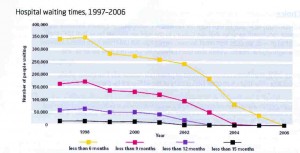
Source: Hospitals and NHS Performance, Department of Health, 2006
We have designed waiting time targets in partnership with staff and patients and have responded when it was clear the national standards wasn’t solving the problem it was designed to address, For example the 48-hour GP access target was intended to ensure that people could have rapid access to their GP services, but in fact some practices interpreted this inflexibly which led to difficulties in arranging appointments beyond the 48 hour period.
Through the hard work of staff, increased capacity, new technology and patient choice we are now in a position where we will see the end of NHS wating lists as we know them and as a consequence fewer targets in the future. Our manifesto commitment to a maximum 18 week wait between GP referral and hospital treatment is already being delivered by 48 per cent of Primary Care Trusts, This new way of measuring waits captures every stage of the patient journey, including waiting for diagnostic tests and outpatient appointments. It will help improve performance across the country so that no patient will be waiting more than 18 weeks for treatment by December 2008,
- 10 years ago under the Tories patients were offered no guaranteed waiting times and people, who often couldn’t afford it, felt forced to pay for private treatment.
- Today waiting lists have been virtually eradicated and patients are offered prompt treatment with no ‘hidden waits’ for tests,
- 10 years from now… how can new technologies help us better target resources?
Choice
We commute more, live further from our families and work different hours. We want and expect convenient services that are tailored to the lives we live, We know that NHS staff want to provide services that meet people’s needs too, but until now have been hampered by a centrally run health system that hasn’t always let them put their patients first.
In our 2005 Manifesto, Labour promised all patients a completely free choice of any hospital or clinic that could offer NHS quality at the NHS price by the end of 2008.
“Scope supports increased choice for all patients, however choice and control is particularly important for disabled people many of whom are significant consumers of NHS services. It is vital that moves to increase choice are extended to people with profound and/or multiple impairments and that appropriate independent advocacy support to make informed choices is provided to this group.” Scope
“Patients should have a right to influence their treatment. GPs and hospital doctors should make patients fully aware of the choices available as an integral part of any discussion with the patient.” Stockport CLP
Since January 2006, all patients have had a choice of at least four hospitals for their elective surgery. We have now extended this through the Extended Choice Network. By July, there will be around 157 foundation trusts and independent providers eligible for the Extended Choice Network, available for patients to choose from.
What choice meant in practice was a question posed in a number of submissions, reflecting perhaps the fact that this is a relatively new innovation. CLPs wanted reassurances that good local services would remain.
We know that some people – particularly those who are better informed – have always been able to make choices about their healthcare by navigating the system, But we believe those same choices and benefits should be available to everyone, which is why we are explicitly introducing choice and putting in place information and support arrangements.
At the heart of our choice and patient empowerment agenda is the understanding that choice is a means of driving improvement and ensuring that the NHS is focused on the needs of patients. We want to ensure that healthcare is not just improving but also becoming more convenient to access,
A number of submissions worried that transport was a practical barrier to making choice a reality with Hertsmere CLP pointing out that “specialist: hospitals now serve a greater catchment area and with higher car parking charges much greater demand is being placed on ambulances for transport to and from hospital. A radical rethink of transport provision is now needed.”
With these reforms the providers of services will be rewarded for delivering good services, providing an incentive for hospitals to change for the better and deliver the services patients want. Patient choice rewards the producers well; but insists in return that it is the user who comes first.
Expert patients
Around 17,5 million people in the UK are living with long-term illness such as asthma, arthritis or heart disease, And the predominant pattern of disease in this country during the second half of the 20th Century and the beginning of the new century is of chronic rather than acute disease.
As the challenges in health change, so too must the NHS, Labour is committed to providing more help for people with long-term conditions such as diabetes, respiratory diseases, and heart problems by trebling the investment in the expert patient programme which allows patients to take control of their treatment and lifestyle.
The Expert Patients Programme is a training programme that provides opportunities to people who live with long-term chronic conditions to develop new skills to manage their condition better on a day-to-day basis.
Challenges for the future
- As real incomes have grown so too have expectations. People are accustomed to much greater choice and high levels of service and expect the same from public services.
- While waiting times are dropping the number of missed appointments are on the increase. The key challenge is ensuring patients understand they have responsibilities as well as rights when it comes to public services.
- New medicines are coming onto the market all the time, The challenge is to balance fair provision within limited resources. New technologies are helping us to better target medicines.
Free at the point of need and fair to all
Our investment in the NHS has ensured that the country’s health system remains free at the point of need, with valued staff working in modern buildings. Our investment has transformed the NHS, with shorter waiting times, record numbers of staff and new buildings and infrastructure. But we are not operating under unlimited resources; our investment of taxpayers’ money has to be targeted to ensure that the NHS continues to provide a world class service,
“The RCN has welcomed the largest sustained increase in spending since 1948 to bring the UK into line with average health spending across the EU, However, strides made will be put at risk if NHS funding is significantly reduced after 2008.” Royal College of Nursing

Source: Statistics on Public Finance and Spending, HM Treasury, 2007
Fairer funding
There are significant inequalities in the use of NHS care between different social classes (as demonstrated in the graph below). Despite often having greater need for increased healthcare, it is often the poorest in society who make least use of the NHS, Research backs this up showing for example:
- Intervention rates of coronary artery bypass grafting or angiography following heart attack are 30 per cent lower in the lowest socio-economic group than in the highest.
- Hip replacements are 20 per cent less commonplace amongst lower socio-economic groups despite roughly 30 per cent higher need.
- A one point move down a seven point deprivation scale results in GPs spending 3.4 per cent less time with the individual concerned.
In order to ensure funding is better targeted at those in need Labour have reformed the way funding is allocated at a local level. With Labour, funding allocations are made directly to Primary Care Trusts (PCTs) rather than through Health Authorities, Our new funding formula, gives a better measure of the health needs of each local community, ensuring that additional resources are targeted to where they are most needed, This was welcomed in submissions.
Access to health services by household income
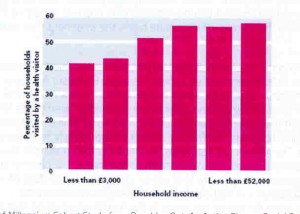
Source: Analysis of Millennium Cohort Study from Reaching Out: An Action Plan on Social Exclusion, Cabinet Office, 2006
- 10 years ago £35 billion was spent on health in England. Spending on health in the UK as percentage of GDP was well below the EU average.
- Today the annual spend on the NHS is £90 billion. Our massive investment has ensured new buildings, more staff and higher quality, faster treatment.
- 10 years from now,..how do we address the poor health outcomes of people from poorer backgrounds?
Reform for a purpose
While extra investment was of course vital to the advances the NHS has made over the past 10 years, money alone could not have changed the way the NHS works and without reform would not have been well spent. Reforms were therefore vital to ensure the service caught up with the expectations of patients today, whose demands and needs are a world away from the demands originally placed on the service in 1948.
Reforms have impacted on how healthcare is provided across the board. Patients can now exercise choice over where they are treated, nurses can now perform a far greater range of tasks, there are new service frameworks, guaranteeing minimum standards of treatment across all major diseases and NICE provides proper independent advice on drugs.
These reforms haven’t always been pain free. In fact the past year has been particularly hard as staff worked to ensure Trusts stayed within their budgets and changed working methods to benefit patients. This was reflected in submissions where people accepted that funding had increased but felt frustration at recent cut backs.
But the effort has ensured that the NHS today is in a stronger position with waiting lists low and reducing, more patients being treated and overall NHS finances in balance, Patient surveys consistently show that people value and rate highly the treatment they receive. To ensure that the NHS in the future remains properly resourced, is clinically led, patient-centred and responsive to local communities, Labour has asked Professor Ara Darzi – one of the world’s leading surgeons – to produce a once in a generation review of the NHS, The Review will be wide-ranging, taking into the account the challenges faced by the NHS today. Patients and staff have been pressing on us the importance of improved patient care and safer and cleaner hospitals. The Review will look at improving both patient care and their environment, The Review will also focus on clinical decision-making in service delivery, and ensure convenient and accessible access to healthcare. The case for an NHS constitution case for a constitution for the NHS will be considered, as the basis of a sustainable and lasting settlement that meets these challenges, enhances local accountability, secures value for money and protects the fundamental values that the NHS has always embodied,
Moving healthcare closer to our communities
“With the move to specialist hospitals and more treatment in local hospitals, doctors’ surgeries and at home it is inevitable that some hospitals will have to close and that blue light emergency services are available in fewer hospitals. Much better public information and explanation is needed if this change in service provision is not to lead to further public protest” Hertsmere CLP
“We would like to see GP services more patient focused and made more accessible and flexible by being available outside normal working hours: early evenings and weekends. We welcome more minor procedures being carried out at GP surgeries. Perhaps GPs should be required to consult their patients as to these needs by means of an annual survey or patients meeting, so demonstrating their accountability.” North East Hertfordshire CLP
Hospitals and the acute sector tend to dominate health policy discussions, but in fact most people’s contact with the NHS takes place outside hospital. We are moving more services out of hospitals and into the community, making healthcare more convenient for patients and improving the way NHS delivers services, Our aim is to move more healthcare services closer to where people live or where is most convenient: in their homes, in local clinics, a new generation of Community Hospitals or new GPs surgeries. This move to increased community services was welcomed in submissions.
To improve the services that people access closer to home we need to change the way that family doctors, Primary Care Trusts and Local Authorities plan and buy services for their local community. We want much better integration between the NHS and social services. And we want to shift the emphasis towards preventing ill health and tackling inequalities. We also need to support diversity in the delivery of services, for example encouraging and supporting nurse-led co-ops. The Royal College of Nursing made this point in their submission saying that “In primary health care, practice nurses, nurse practitioners and other community nurses are revolutionising patient access to services” and that “it is important to recognise in the development of future policies the leading role that nurses can play as part of the health team or in leading practice.”
Labour believes the best way to do this is to empower those closest to patients – GPs and other professionals in the community, Practice based commissioning is an opportunity for the NHS to focus more on prevention, working with social care to meet the needs of individuals and communities.
“GPs hours must be more accessible. GPS salaries have increased ..patients should expect flexible hours in return, in both rural and urban areas. At the same time we should be encouraging the growth of walk-in centres, to plug the gap in hours.” North West Regional policy forum
To ensure everyone has access to a GP and primary care, regardless of where they live, we have committed to establishing new primary care services, especially in deprived neighbourhoods. Despite the fact that we have over 5,000 more GPs than in 1997, there remains a shortage of provision in the poorest areas that need them most, The need for increased provision was reflected in a submission from Chipping Barnet CLP, who called for the government to “increase the number of GPs, maybe at satellite clinics eg Tescos and schools,”
We are working to ensure NHS organisations are more accountable to the communities they serve, We have placed a duty on strategic health authorities, primary care trusts and NHS trusts, to make arrangements to involve and consult patients and the public in planning services they are responsible for, developing and considering proposals for changes in the way those services are provided and any decisions that will affect how those services operate,
There was a clear indication from submissions, particularly those from constituency Labour Parties, that local communities should be consulted more and given a bigger say in their local health service. Chalk & Westcourt branch felt the “Lack of community representatives on PCTs and SHAs was a real issue.” While Battersea CLP called on the government to “make the NHS more democratically accountable by elected representatives in local authorities.” Similarly a policy forum held by Blaydon CLP made two points firstly that we consider “how we give our local communities a greater role in holding NHS trusts accountable” and secondly called for “more power over NHS service devolved to local level but with accountability to the local community rather than just the trusts themselves,”
Access to dentistry
“given the limited resources of the NHS, a missed appointment or late cancellation deprives other patients of the opportunity to receive treatment and is an avoidable waste of valuable resources, but the new [dental services] contract does not allow dentists to charge NHS patients for missed appointments. The BDA believes there should be a capped cancellation charge to act as a deterrent, with dentists able to claim ‘Units of Dental Activity’for missed appointments or late cancellations,” British Dental Association
One area where local provision may not match need is in the ability to access dental services. Labour is reforming NHS dentistry to achieve better oral health and to provide a good deal for patients and for dentists, Our reforms have provided new contracts for dentists, a simpler system of dental charges and have moved commissioning dental services to a local level.
Primary Care Trusts are now responsible for local NHS dental services and have ring-fenced money that must be used for local dental services, This reform means gaps in provision can be identified by PCTs who will agrees contracts with NHS dentists for services that best meet local needs and can influence where new practices are established. If a dentist moves, closes down a practice or reduces the amount of NHS dentistry he or she provides, the money to provide this service now remains with your PCT for reinvestment in NHS dentistry for the local community.
Compared to three years ago, this Labour government is now spending £400 million more on NHS dentistry each year, part of which was in a capital investment programme of £80 million over four years to support a 25 per cent expansion in the number of training places for dentists,
To improve access for patients we have set up 53 Dental Access Centres to provide services to people experiencing problems obtaining NHS dental treatment. These centres will allow people who have been unable to obtain routine care, or who prefer not to register with a General Dental Practitioner, to gain access to treatment when they need it.
Diversity of providers
The commission received a number of submissions regarding the use of private sector providers in the NHS. While the vast majority of NHS provision is provided by the public sector it was clear from submissions that people wanted assurances that the NHS would remain true to its founding principles, The use of the private sector was recognised as bringing clear benefits, particularly in driving down waiting times and increasing capacity and choice for patients, Unison asked that “wherever possible services should be kept in house and there should be an assurance that the quality of care does not suffer and that value for money is achieved.” Similarly Unison stressed that “efficiency is not restricted to the private sector and a continuing investment in new technologies and in-house innovation is the best way to achieve value for money for the tax-payer pound.”
We have not been idealistic about the use of private sector providers in the NHS – instead basing decisions on what is best for patients, Since 1997 we have brought in new providers where they add capacity or promote innovation, giving power to patients over their own treatment and over their own health,
Our involvement of private sector providers in the NHS is not new. Since 1948 the NHS has made use of private sector providers. The vast majority of GPs and pharmacists are in effect self-employed with the NHS buying their services. Similarly in mental health and family planning a sizeable proportion of NHS services are provided by the private sector,
Expansion in NHS capacity will come both from within the NHS as well as the independent and third sector, Wherever NHS patients need new capacity for their healthcare, we will ensure that it is provided from whatever source – all of it in line with the founding values of the NHS that care should be provided free at the point of use, based on need not ability to pay,
Supporting NHS staff
Staff are key to improving the National Health Service. Without the good will and support of staff we would not have made the dramatic improvements the NHS has witnessed over the past 10 years. Since 1997 we have worked in partnership with staff and their trade union representatives to dramatically improve working conditions, pay and prospects, against a backdrop of more investment resulting in more staff in the NHS.
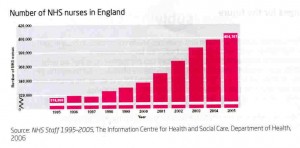
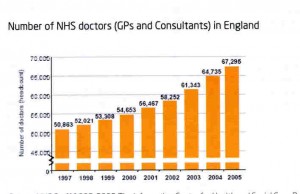
Source: NHS Staff 1995-2005, The Information Centre for Health and Social Care, Department of Health, 2006
Agenda for Change means more patients treated faster, with pay reform tied to shorter waiting lists; increased skills development for staff; better recruitment and retention for staff; breaking down barriers between staff; more flexibility in deployment of staff and more opportunities for staff; all of which delivers improved care for patients.
As we change the way the NHS works it is necessary for staff to develop their skills. It is both Labour’s policy, and the natural progress of healthcare, to reduce reliance on hospital-based staff, We have mapped out a future health system, which offers more care, closer to home and less dependence on the acute sector. This will mean more staff employed in primary and intermediate care and fewer in hospitals, We will support staff through these changes so that existing staff can retrain for positions in these emerging community-based roles.
Challenges for the future
- The NHS doesn’t operate with unlimited resources. Waste still remains an issue in such a huge organisation; we need to ensure best value for taxpayers money,
- An inevitable consequence of moving healthcare into the community is that we need less large scale hospitals. However local communities are often opposed to any changes to their local service. We need to communicate the need for change better, emphasising always that decisions about changes to local provision are clinically led.
- We need to do more to ensure dentists stay in the NHS and operate in under-serviced areas,
- Staff are key in ensuring reforms to the NHS are successful, We need to ensure their views and experiences inform decisions.
Care tailored to individual need
As people live longer lives so the services they require from the NHS change. And while older people are the largest demographic groups requiring NHS services it is also important to consider service provision from the perspective of those with long term needs or serious disabilities.
For those who need long term care from the NHS a common frustration is that the different parts of the service providing the care do no speak to each other. Ensuring the NHS works as a whole requires us to consider service provision from the patients’ perspective. By giving local authorities and the NHS stronger incentives to work together, we have already reduced the number of patients remaining in hospital due to a lack of arrangements in place to support them in the community.
Now we will strengthen this joint working, by introducing a single assessment of health and care needs and a joint care plan for people with the most complex needs, By 2008, we will expect Primary Care Trusts and local authorities to establish joint health and social care teams. A common budgetary and planning system will also support more organisations’ in their efforts to jointly commission services,
Building modern social services
“Home core services should act as the eyes and ears of social services, with staff enabled to spend adequate time with service users, spot problems early and mobilise other agencies as required.” Unison
Around 1.5 million people in England rely on social services for support and care. The services provided by social care, when done well, can transform people’s lives, giving them new opportunities, helping them to live independent lives and providing personal care with dignity and understanding,
Labour believes social services should be person-centred, seamless and proactive, Person-centred services will give the individual real options and we expect everyone to have a spectrum of choice available, choices that help maintain independence, not create dependence, The development of Direct Payments, Individual Budgets and In Control projects are examples of new services which have responded to people’s views. The result is that people have taken control and choice over services which have been redesigned to meet their needs.
“People experience of [social care] services as too rushed, with too little time allowed. The ’15 minute slot’ model of service inhibits proper relationships forming between care workers and the people they care for; at worst it results in services that do not respect people’s rights and dignity.” Commission for Social Care Inspection Time to Care’ report
To maintain this move towards more personalised social services requires more joined-up working between local authorities and Primary Care Trusts (PCTs), which is now improving thanks to increased coterminosity – councils and PCTs covering the same areas.
Supporting carers
“Support for carers -financial and practical – needs to be ensured, especially with an ageing population putting an increased strain on the NHS and social services,” Bolton North East CLP
There are 6 million people caring for relatives or friends with long term needs. Labour recognises and values highly the often unsung role that millions of carers perform every day and the relief they give to NHS services. Many carers struggle to balance their work and caring responsibilities, or have to cut back on work, or give up their jobs entirely, in order to care for others.
Often when carers reduce or give up their own work their own health suffers, People caring more than 50 hours a week (125 million people) are twice as likely not to be in good health as people who are not carers. That’s why we’ve taken action to strengthen carers’ rights and to improve their services and support.
Labour’s National Strategy for Carers, published in 1999 set out our plans to provide better support and information for carers, and to ensure they have better access to health services. We have committed to updating and extending the National Strategy to reflect developments in carers’ rights, direct payment regulations, carers’ assessments and carers’ grants,
We will work with carers and their representatives in drawing up a cross-government strategy that promotes the health and well-being of carers, including the particular needs of young carers,
The New Deal for Carers was announced in February 2007 and commits to a range of new measures which recognise the essential role of carers including:
- An extra £25m for short-term home based respite care for carers in crisis or emergency situations in each councils;
- An extra £3m towards the establishment of a national helpline for carers because access to good information is essential;
- An extra £5m to support the development of an experts’ carers programme which will provide a service to meet the personal needs of carers including stress management services for carers, communication skills, first aid and as well as other skills to help care safely & effectively.
Labour has provided financial support through the carer’s allowance – £44.35 a week. Today 425,000 people are benefiting from an annual allocation of just over 1 billion pounds and there are on average 8,000 new new claimants receiving the benefit every month. And carers will also have access to other help through the social security system, including the Carer Premium and the additional amount paid in Pension Credit, currently £25.55 a week, Our reforms of the pension system will modernise the basic and second state pensions by rewarding social contributions and cash contributions equally,
As of this year we have also guaranteed the right for 2,6 million carers to request flexible working to help them better balance their work and caring responsibilities.
Dignity in later life
“We believe the next Labour Party manifesto needs to have in place policies that address the demographic challenge we face. We would like to see a commitment to developing a fair and sustainable funding system for long term care that provides a higher level of support to service users while balancing the contributions from the individual and the state.” The Alzheimer’s Society
We recognise that elderly people want to stay in their own homes and outside institutions for as long as possible, As part of our choice agenda, we will develop a strategy for longterm care that aims to promote independent living for elderly people wherever possible,
Labour is working to improve standards of care and ensure fair access to services for all older people. We delivered on our promise to make nursing care free in England and 123,500 people are benefiting, Another 31,000 people are getting all of their costs aid by the NHS. We are expanding services such as Intermediate Care for all older people who need them, enabling them to be more independent and to delay, or avoid, the need for them to enter residential or nursing home care.
Too many older people are required to stay on in hospital due to a lack of care facilities in the community. Labour has required local authorities to take this problem more seriously by placing a financial penalty on local authorities who do not meet the needs of older people moving from hospital. Working in partnership with local authorities backed up with the prospect of financial penalties we have significantly improved services and reduced the number of older people detained in hospital unnecessarily.
Changing demographics will lead to long-term pressures in health and social care,
Public spending as a per cent of GDP
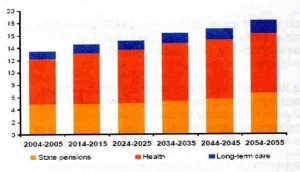
A new focus on improving mental health
One in six people suffer from mental health problems at some time in their lives with over one million people each year seek specialist treatment Because mental health problems are so common, over the last ten years, Labour has given a much higher priority to mental health services, We have invested enormously to improve the services provided and put in place reforms to ensure this extra funding delivers real improvements to patients.
Since 1997 we have substantially increased investment in mental health services and have ensured there are record number of staff working in the mental health sector. Since 1997 there are over 9,300 more psychiatric nurses, 1,353 consultant psychiatrists and 2,700 more clinical psychologists.
We are developing new and innovative community services which are improving access to mental health services. There are 700 new mental health teams offering treatment at home, early intervention or intensive support.
Mental health service users and and carers are now able to exercise more choice, be treated at home instead of in hospital when appropriate and access services more easily in an emergency, Evidence from a number of areas suggests a significant impact with fewer patients being admitted to hopital and reduced use of the Mental Health Act.
The current Mental Health Act is now more than 20 years old. We are reforming our mental health laws in order to reflect advances in knowledge and treatment. We want to modernise the law to remove obstacles, both for community-based and hospital treatment for the good of patients themselves and to help better protect the public.
One in five mental health in-patients comes from a black and minority ethnic (BME) background, compared to about one in ten of the population as a whole. Research shows that people from black and minority ethnic (BAME) communities can suffer from inequalities in access to mental health services, in their experience of those services, and in the outcome of those services. For example, BME patients are significantly more likely to be detained compulsorily or diagnosed with schizophrenia. The Department of Health’s Delivering Race Equality programme is a comprehensive action plan for eliminating discrimination and achieving equality in mental health care for all BME patients.
Challenges for the future
- Public perceptions of social care means attracting new staff can be a challenge, We need to raise the profile of social care as a career choice,
- The number of carers, and young carers, is set to grow as our population gets older, We need to support people providing care to their family,
- As people live longer health funds will increasingly shift to long term care priorities,
- Despite one in six of the population experiencing mental health problems at some stage in their lives a stigma remains around mental health, We need to ensure people know that support is available and they can access suitable treatment
Meeting tomorrow’s health challenges
Our approach to healthcare must reflect the changing demographics and lifestyles of the population.
People today eat more and exercise less. Medical treatment for lifestyle’ diseases has increased significantly. The prevalence of diabetes worldwide among adults is expected to rise by 50 per cent in the next 25 years. Obesity has already trebled in the past 25 years.
Percentage of total population classified as obese
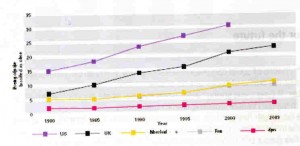
Source: Health at a Glance OECD 2005; Tackling Obesity in England National Audit Office 2001
Despite this, the UK population as a whole is living longer. As with most developed economies, the UK has an ageing population (see graph). In 2050, it is expected that 29 per cent of the population will be over 60 years old, up from 21 per cent in 2006, There will be continued population growth and a rise in the number of households, By 2050, it is expected that the combined cost of pensions payments, healthcare and longterm care will be 19.3 per cent of GDP, Today this is 14,6 per cent of GDP. Chronic care, such as that provided for diabetes, lung disease and cancer, already costs the NHS 80 per cent of its budget, and this proportion is set to grow,
Changes in the population aged under 16 and over 65 between 1971 and projected to 2021
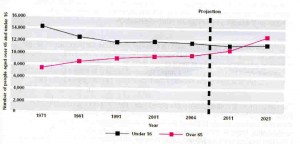
Source Social Trends 36 Office for National Statistics 2006
Labour recognises that to reduce health inequalities and tackle the prevailing illnesses of the future, we have to tackle the causes as well as the consequences of ill health, We are taking prevention as seriously as cure and recognise that better health depends as much on the responsible actions of the public as it doesLabour on the quality of services.
“As prevention is dramatically cheaper than cure, PCTs should require CP practices to arrange nurse screening of all patients after 5 to 10 year intervals.” Wirral West CLP
As individuals and as a nation we need to take our health and fitness more seriously. That is not to say there is no role for government, but a recognition that people need to take responsibility for their own lifestyle choices and the way they live their lives,
The role of government is to create the right conditions for health, and to tackle the factors that increase the likelihood of poor health, poor housing, poverty, unemployment, crime, poor education and family breakdown. But we must also work in partnership with communities and individuals so they can properly take responsibility for improving their own health and wellbeing.
“For the longer-term, a greater emphasis on prevention and public health is one way of saving the NHS money and ensuring its continued sustainability as a publicly funded service free at the point of need.” Unison
Meeting tomorrow’s health challenges
Increasingly the health challenges people are facing are brought on by lifestyle choices -alcohol abuse, binge drinking, an unhealthy diet, and smoking are all contributing to demands on the health service that are otherwise avoidable.
Obesity now affects 22 per cent of adults and all indicators show the proportion of people classified as obese is set to increase. Obesity magnifies the risks of heart disease, diabetes and cancer, and shortens life by as much as nine years. So to make the healthy choice easier we are committed to putting in place a simple system of labelling to make it simpler for busy shoppers to see at a glance how individual foods contribute to a healthy balanced diet,
The ban on smoking in all enclosed public places took effect across England in July 2007. Initial findings from Scotland, where a ban has been in effect for over a year suggest the move not only helps people to give up smoking but is also popular with smokers and non-smokers alike. These restrictions will be accompanied by an expansion of NHS smoking cessation services to encourage and support smokers to improve their own health by giving up smoking.
Sexually transmitted infections, including HIV and chlamydia, are on the increase and we are clear that more needs to be done to improve people’s sexual health. We are investing in national campaigns to raise awareness, prevent the spread of STIs and reduce unintended pregnancies, We are also committed to speeding up access to Genito-Urinary Medicine (GUM) clinic appointments.
Millions of people enjoy drinking alcohol with few, if any, ill effects. But, increasingly, alcohol misuse by a small minority is become a major and growing cause of ill health as a result of binge and chronic drinking. Labour in government recently set out the next steps in the National Alcohol Reduction Strategy for England, This strategy includes plans to:
- A review of NHS alcohol spending – A root-and branch stock take of the burden of alcohol-related harm on NHS resources will be carried out to inform smarter spending decisions, driving local investment in prevention and treatment while delivering better health and saving the NHS money.
- More help for people who want to drink less – Many people who reduce their drinking to within sensible limits don’t need or want professional help, but there are many people who would like more support. We will develop and promote sources of help for people who want to drink less, including telephone helplines, interactive websites and support groups.
- Public information campaigns to promote a new sensible drinking culture – A new generation of publicity campaigns will mark a paradigm shift in the ambition and impact of public information about alcohol, The ‘Know Your Limits’ campaign will continue to develop and expand, acting as a call to action to promote sensible drinking and highlighting the physical and criminal harm related to alcohol misuse.
Our efforts to change Britain attitude to alcohol has to start young. As the graph below shows the number of adolescents drinking alcohol is on the increase,
Average UK alcohol consumption for children aged 11-15 who drank last week

Promoting healthy choices in early years
“Encourage a greater interest in personal health by having schools imbue a sense of personal responsibility for ones health, Parents will make healthy choices for their children if foods with excessive amounts of fat, sugar or salt are made exorbitantly expensive by a tax or duty.” West Kirby and Thurstaston Branch
By promoting healthy lifestyle choices to children at a young age we will ensure our young people grow up understanding the importance of a good diet and regular exercise, Through Sure Start we are working with parents to ensure they have the support and information they need to get their children off to the best start in life.
We have already extended the provision of free fruit to all four-to six-year-olds at school and are building on this with improved school meals through extra investment higher standards and improved school kitchen facilities, And we want to help parents resist ‘pester power’ by restricting further the advertising and promotion to children of those foods and drinks that are high in fat, salt and sugar.
Tackling childhood obesity is a government-wide priority and we have set a target to halt the year-on-year increase in obesity in children under 11 by 2010. We have made huge steps forward already in starting to change attitudes through the Five A Day campaign, the school fruit scheme and more investment in school food. Our public health agenda is the first concerted attempt to seriously tackle rising levels of obesity.
- 10 years ago there were no restrictions on advertising to children so tobacco and alcohol were promoted near schools and junk food pitched to children on television,
- Today the ban on smoking means most public places are smoke free,
- 10 years from now,..how do we change Britain’s relationship with alcohol?
We know that participating in sport and physical activity is crucial in tackling obesity, We are investing over £1 billion in school sport and want young people to have every opportunity to play sport both in school and outside the curriculum. This will ensure a step change in the range and quality of PE and sporting opportunities in schools with 3,000 coaches, 15,000 sports teachers and more than 2,000 new facilities.
Our longterm ambition is to offer all children at least four hours of sport, two hours of PE within the curriculum and at least two to three additional hours of sport outside of school by 2010, And as we move towards extended schools, which offer access to sports, art, drama and homework clubs among other activities, more young people and their families will be encouraged to set involved in healthier activities.
Challenges for the future
- Sexually transmitted diseases and unwanted pregnancies are on the increase. We need to better communicate the risk of unprotected sex, especially to young adults,
- Growing childhood obesity levels mean we are storing up problems for the future, We need to help patients to make healthy choices for their children,
- Binge and problem drinking, while not unique to Britain is not a problem we share with all other countries. There need to be a shift in public attitudes to alcohol.
